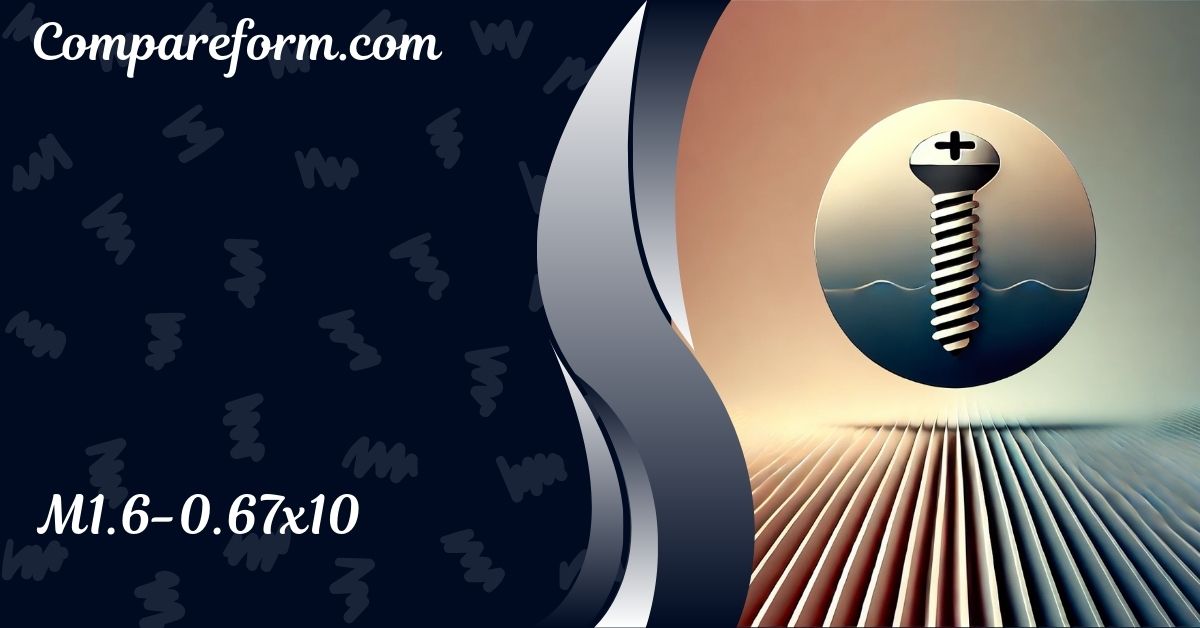M1.6-0.67×10 – Understanding Fasteners!
When I used the M1.6-0.67×10 screw for assembling my DIY electronics project, it fit perfectly and held everything securely. Its precision threading made installation easy, and the device has been rock solid ever since!
The M1.6-0.67×10 fastener is a small but essential screw, used in industries like electronics, automotive, and aerospace for its precision and reliability. It plays a vital role in securing components in tight spaces while ensuring durability.
We’ll uncover how the M1.6-0.67×10 fastener impacts industries from electronics to aerospace, discussing its specifications, practical uses, and why it’s a go-to choice for precision and durability.
What Does M1.6-0.67×10 Mean?
To start, let’s break down the term M1.6-0.67×10. Every component of this designation has a specific meaning:
- M1.6: Refers to the diameter of the screw in millimeters. In this case, the diameter is 1.6 mm.
- 0.67: This number refers to the thread pitch, which is the distance between the threads. A thread pitch of 0.67 mm means there are finer threads compared to other fasteners.
- 10: The length of the fastener, measured in millimeters. 10 mm is the length of this particular screw.
Breakdown of Key Terms:
- Diameter (M1.6): The diameter of the screw shaft.
- Thread Pitch (0.67 mm): The space between the threads.
- Length (10 mm): The length of the screw from the base to the tip.
Understanding the Importance of M1.6-0.67×10 in Fastening Systems
Fasteners like the M1.6-0.67×10 play a pivotal role in assembling various components securely. The combination of diameter, pitch, and length makes this screw suitable for specific applications where smaller, precision fasteners are necessary.
Fasteners are often overlooked, but without them, machines, electronics, and even furniture wouldn’t stay together. Here’s why the M1.6-0.67×10 fastener is important:
- Precision: The M1.6 diameter and 0.67 pitch provide a snug fit that ensures parts are tightly secured, especially in small assemblies.
- Versatility: The 10 mm length is a common size used across various industries, from consumer electronics to small engines.
- Durability: When manufactured from materials like stainless steel, these fasteners offer long-lasting performance in harsh environments.
Common Applications of M1.6-0.67×10 Fasteners
Fasteners like the M1.6-0.67×10 are widely used in industries that require precision and strength. Below are some of the most common applications:
1. Electronics
Electronics often require small, precise fasteners to hold circuit boards, casings, and other components together. The M1.6-0.67×10 screw is an ideal choice for smartphones, laptops, and other compact devices where space is limited and tight fastening is crucial.
2. Automotive
In the automotive industry, fasteners like M1.6-0.67×10 are used in assembling various components, including dashboard assemblies, electronic control units, and other critical parts. These screws help ensure that sensitive electronic components remain firmly in place even under high vibrations and stress.
3. Aerospace
Aerospace applications often demand high-quality, reliable fasteners. The M1.6-0.67×10 screw is used in assembling avionics, sensors, and lightweight components. The fine threads and small diameter help reduce weight while providing a secure fit in tight spaces.
4. Home Appliances
Home appliances, such as washing machines, microwaves, and refrigerators, also rely on fasteners like the M1.6-0.67×10. These screws are often used in securing internal electronic boards, plastic casings, and other small components that need to be tightly fastened to prevent malfunction.
Key Benefits of Using M1.6-0.67×10 Fasteners
Fasteners like M1.6-0.67×10 offer several advantages for industries where precision, strength, and versatility are critical. Here are some of the key benefits:
1. Compact Size
The small size of the M1.6-0.67×10 makes it perfect for applications that require fastening in confined spaces. Its small diameter allows it to fit into tiny areas without compromising the overall assembly.
2. High Precision
With a thread pitch of 0.67 mm, these fasteners provide a tighter grip and are less likely to loosen over time. This is particularly important in sensitive electronics and automotive applications where movement or vibration could lead to damage.
3. Material Flexibility
The M1.6-0.67×10 fastener can be manufactured from a wide range of materials including stainless steel, brass, and carbon steel. Each material offers unique advantages in terms of strength, corrosion resistance, and temperature tolerance.
4. Corrosion Resistance
When made from stainless steel, the M1.6-0.67×10 fastener offers excellent corrosion resistance, making it ideal for use in environments where moisture or chemicals may be present.
5. Cost-Effective
These screws are cost-effective, especially when ordered in bulk. Their small size and versatility make them a staple for manufacturers across multiple industries, saving both time and money during assembly.
How to Choose the Right M1.6-0.67×10 Fastener for Your Project
Selecting the right fastener can make or break your project. To choose the best M1.6-0.67×10 fastener for your needs, consider the following factors:
1. Material Selection
Different projects require different materials. For instance, if your project involves exposure to moisture or harsh chemicals, you may want to opt for stainless steel due to its corrosion resistance. Alternatively, brass or carbon steel can be used in dry environments where strength is prioritized.
2. Thread Type
The thread pitch of 0.67 mm on the M1.6-0.67×10 provides a snug fit. However, different thread types might be better suited for specific applications. Fine threads are ideal for precision equipment, while coarse threads are used for projects requiring quicker assembly or disassembly.
3. Tensile Strength
Ensure the M1.6-0.67×10 fastener you choose has the appropriate tensile strength for your application. Tensile strength measures how much stress the screw can withstand before breaking. Applications in aerospace or automotive industries often require fasteners with higher tensile strength.
4. Length
The 10 mm length of the M1.6-0.67×10 is suitable for many applications, but be sure to check if this length is ideal for your project. If you require a longer fastener, consider a similar fastener with an increased length.
Installation Tips for M1.6-0.67×10 Fasteners
Proper installation of M1.6-0.67×10 fasteners is critical to ensuring the success and longevity of your project. Follow these tips to ensure a proper fit:
1. Use the Correct Tools
Always use the appropriate screwdriver or drill bit for the M1.6-0.67×10 fastener. Using the wrong tool can strip the screw head, making it difficult to remove or tighten properly.
2. Apply the Right Torque
Over-tightening or under-tightening the fastener can lead to issues. Too much torque can strip the threads or break the fastener, while too little can cause the screw to loosen over time. Follow the manufacturer’s guidelines on the proper torque settings.
3. Ensure Proper Alignment
When inserting the fastener, make sure the components being fastened are properly aligned. Misalignment can cause stress on the fastener, leading to premature failure.
Material Choices for M1.6-0.67×10 Fasteners
The M1.6-0.67×10 fastener is available in various materials, each offering its own advantages depending on the intended application. The most common materials include:
1. Stainless Steel
Stainless steel fasteners are highly corrosion-resistant, making them ideal for use in harsh environments, such as automotive and aerospace applications. Stainless steel also offers excellent durability and strength.
2. Brass
Brass is known for its good corrosion resistance and electrical conductivity, which makes it a popular choice for electronics and electrical applications. It’s also more malleable than steel, allowing for easy installation.
3. Carbon Steel
Carbon steel is strong and affordable, making it a go-to material for a wide variety of general-purpose applications. However, it is less resistant to corrosion compared to stainless steel.
4. Nylon
Nylon fasteners are lightweight and corrosion-resistant. They are commonly used in electronics or applications where the fastener will not be exposed to high levels of stress or heat.
Frequently Asked Questions (FAQs)
1. What is the M1.6-0.67×10 fastener used for?
The M1.6-0.67×10 fastener is used in a wide range of applications, including electronics, automotive, aerospace, and home appliances. Its small size and fine threading make it ideal for securing small parts that require precision.
2. How strong is the M1.6-0.67×10 fastener?
The strength of the M1.6-0.67×10 fastener depends on the material from which it is made. For instance, stainless steel versions offer high tensile strength and excellent corrosion resistance, making them suitable for demanding applications.
3. Can I use the M1.6-0.67×10 screw in outdoor applications?
Yes, especially if the fastener is made from stainless steel or another corrosion-resistant material. However, it’s important to choose the right material based on the environmental conditions.
4. What tools are needed to install the M1.6-0.67×10 fastener?
A screwdriver or a drill with the appropriate bit size is typically used to install M1.6-0.67×10 fasteners. Ensure that the tool fits the head of the fastener to prevent stripping.
Conclusion
The M1.6-0.67×10 fastener may be small, but it plays a significant role in various industries. Its precision, durability, and versatility make it indispensable for applications in electronics, automotive, aerospace, and home appliances. Understanding the specifications and selecting the right material ensures that your projects are securely fastened, providing long-lasting performance.
Whether you’re an engineer, a mechanic, or a DIY enthusiast, having a deep understanding of fasteners like the M1.6-0.67×10 is crucial for successful assembly and manufacturing.






